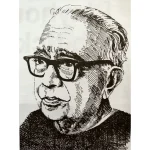We read The Covenant of Water by Abraham Verghese for our book club recently. Sanghamitra Bose, Founder of Sshrishti Trust, reviews the book:

This is an engrossing read that is exquisitely crafted by the author Abraham Verghese, who took 14 years to write this epic. He is a doctor and a professor of infectious diseases. His medical knowledge and his deep empathy for the suffering of humanity come alive in the pages of the novel.
The novel displays a broad sweep of the canvas which covers 1900 to 1977 and stretches from Parambil, a village in Kerala, to Glasgow in Scotland. The time span covers the pre-independence era of India, a tumultuous time in history with ravages of World War II and the changes in the Indian subcontinent, with India in the process of freeing itself from its colonial masters.
The novel begins with a fatherless girl from an impoverished family, who is married off at the age of 12 to a man of forty. Her husband does not travel in the boat with her to his home but prefers to walk to his home which is a day’s walk. She learns that his family has the “condition” whereby in each generation someone dies by drowning. Her husband, who is referred to by everyone as Thambram, owns the 50-acre estate of Parambil. A river runs by the estate, but unlike other houses in Kerala, his house is built at a distance from the river, ostensibly to save the family from the “condition”. The estate and its people and that includes the elephant Damodaran, become the life of the little bride.
The little bride grows into a loving wife, a devoted mother to her stepson, JoJo and manages to run the household efficiently. Like everything in her new home, she learns to live amicably with the spirit of her husband’s deceased wife, who haunts the cellar where pickles are stored and is helpful to her and the family in more ways than one. As wife of the Thambram, she is referred to as Big Ammachi by all those who know her and ultimately becomes the matriarch of Parambil after the death of her husband.
The novel uplifts the spirit with the deep humanity of the protagonists. Big Ammachi’s generosity of spirit, her deep faith in Lord Jesus and her commitment to the estate and its people sets the tone of the novel. Shamuel, the faithful retainer of Parambil, who has been a shadow of his Thambram all his life, is exemplary in his love and loyalty to the family. He accepted the societal rules which forbade a low caste Pulayan like him to enter the home of his high caste master. He was therefore aghast and fled when his master’s son Philipose, and his bride went out of their way to touch his feet after they returned to Parambil, as newly-weds.
The doctor Digby, who grows up as an orphan in Glasgow, has a tortured childhood and ultimately lands up in the government hospital in Madras as a surgeon, is another character who stands out by his deep empathy for his poor Indian patients and feels it is his duty to treat all his patients with love, as though they were his family members. Another remarkable character is Dr Rune, a doctor from Sweden who has devoted his life to work with lepers in a leprosarium in Kerala. He treats Digby for his severe burns which leaves Digby broken, as he realises that he will never again be able to perform surgery. Rune dies while serving the lepers in the institutions. We see disabilities of the lepers, the deafness of Philipose as examples of people suffering discrimination for their physical conditions and the mental scarring because of it. The novel points out the need to treat them with deep empathy. We also see the example of love, loyalty in Joppan, the son of Shamuel. As his childhood friend, he is instrumental in Philipose finally quitting his opium addiction but he refuses the land offered by Philipose after the death of his father and points out that Philipose’s father had given acres of land to his relatives but had given a small piece of land to Shamuel, enough for him to build a hut, because of his status as a low caste servant. Joppan is fiercely independent and takes a stand against the prevalent caste system; he is the voice of the new emerging India.
The “condition” that afflicts the family takes its toll. JoJo falls in an irrigation ditch and dies and Elsie the beautiful wife of Philipose apparently ends her life in the river. The family lives through other great tragedies. Philipose and Elsie’s first-born baby Ninen dies a tragic death, speared by the branches of a haphazardly cut down jackfruit tree, and Big Ammachi’s first born Baby Mol, is destined to remain a child all her life. It is her deep faith that helps Big Ammachi cope with the grief and bring up her motherless granddaughter, Mariamma, who is her namesake. The novel unflinchingly portrays the sexual abuse that Mariamma faces in her quest to become a doctor but finally succeeds in achieving her dream. Big Ammachi and Baby Mol die on the same night. By accepting her imminent death with grace, Big Ammachi once again displays how her faith remains her strength till the last moments of her life. Mariamma, after the death of her father, conducts an autopsy on the dead body of her father and manages to solve the mystery of the condition that the family suffered from. The book also includes a twist in its tale which is unsuspecting.
It is difficult to capture the essence of this novel of 750 pages in a few words but undoubtedly, it celebrates the resilience of the human spirit. Oprah Winfrey, in conversation with the author, has therefore done a six-episode analysis of the novel. She calls it: “An exquisite mystical novel with great spiritual teaching.” And one can’t agree more.




